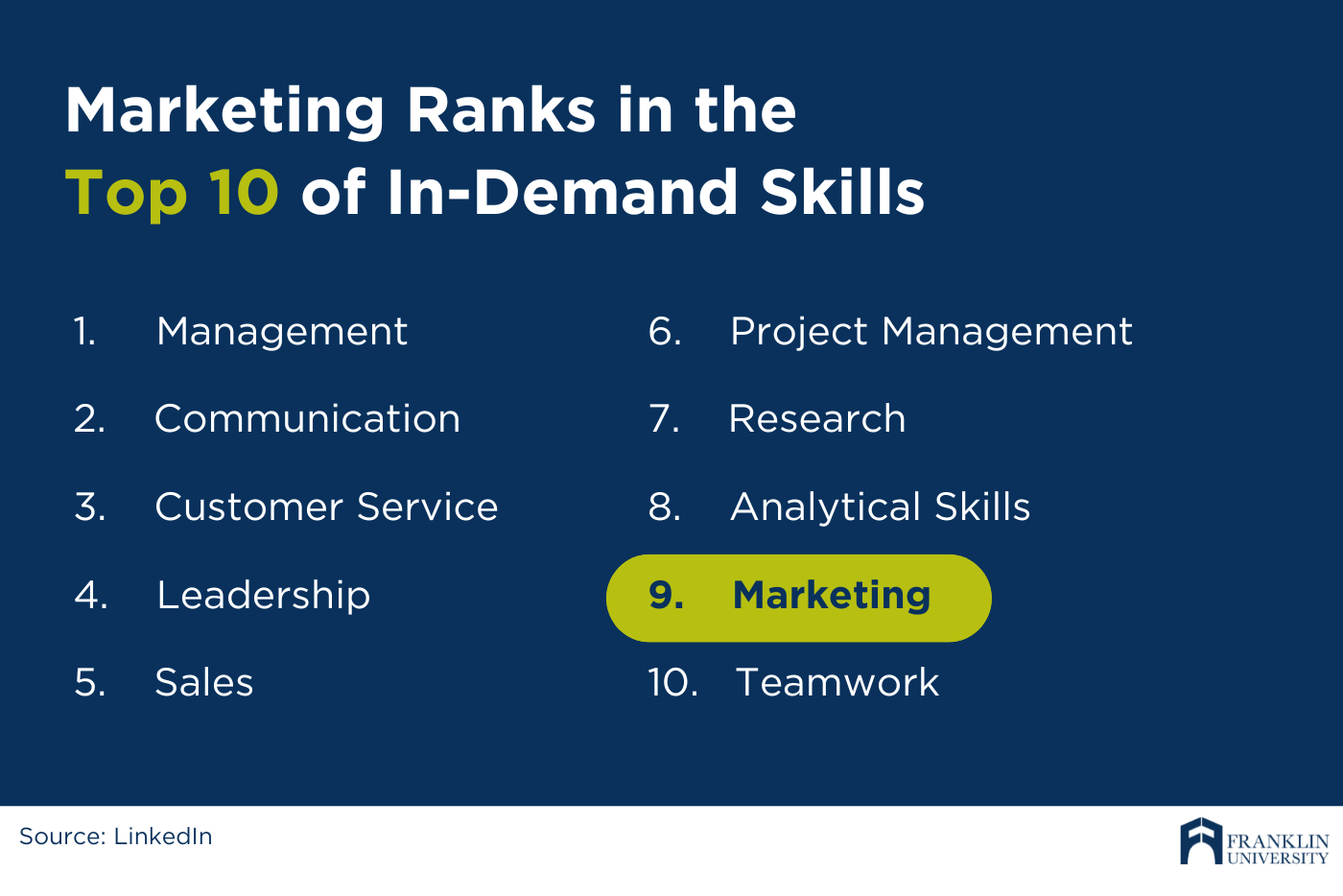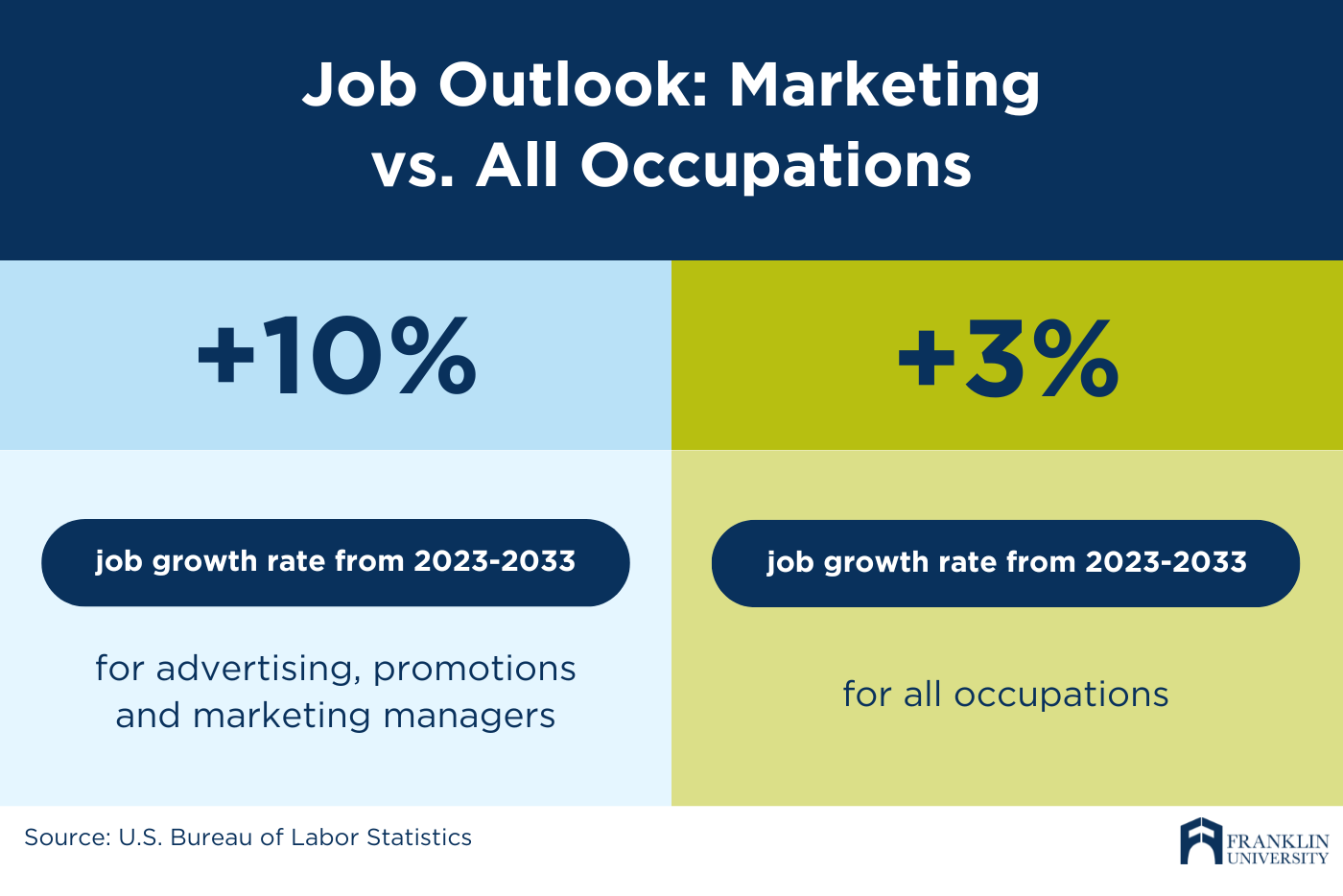Request Information
We're Sorry
There was an unexpected error with the form (your web browser was unable to retrieve some required data from our servers). This kind of error may occur if you have temporarily lost your internet connection. If you're able to verify that your internet connection is stable and the error persists, the Franklin University Help Desk is available to assist you at helpdesk@franklin.edu, 614.947.6682 (local), or 1.866.435.7006 (toll free).
Just a moment while we process your submission.

Is A Master’s in Marketing Worth It? 5 Reasons the Answer Is ‘Yes’
Thousands of job opportunities and a top 10 ranking by LinkedIn as one of the most in-demand skills that companies need most means that there’s no better time or bigger need for skilled marketing professionals than right now.

The explosive growth of marketing is a result, of course, of the increasing importance of digital media, including video, display and social communication and advertising. Which means that marketing–and marketing leaders–are in the midst of their own transformation.
Marketing has evolved from being a function to a strategy as organizations rely heavily on marketing leaders to help them innovate and differentiate themselves.
What Is an M.S. in Marketing?
A master’s degree in marketing is a graduate level degree designed to extend and strengthen your skills so you can better lead organizations with big-picture thinking, market research, consumer analytics, brand management and digital strategies.
A master’s degree in marketing also lets you advance your marketing knowledge, bridging the gap between what you know and what you need to know regardless of what industry you’re in.
Thinking About a Master’s in Marketing? Questions to Ask Yourself First.
If you’re reading this, chances are you’ve thought long and hard about upping your marketing-related skills. Here are some simple “yes” or “no” questions to ask yourself so you can decide if a master’s in marketing is worth it:
- “Am I a marketing professional who wants to stay ahead of changes in the field?”
- “Am I looking to completely change the course of my career and think I would enjoy pivoting into marketing?”
- “Do I think of myself as a lifelong learner who is looking to increase my marketing knowledge and insight?”
- “Even though I’m not ‘in marketing,’ would I benefit from knowing more about how marketing impacts my work?”
- “As an entrepreneur, would knowing more about marketing principles, branding and social media make me more successful?”
Is a Master’s in Marketing Worth the Investment?
Whether you’re a career marketer, an entrepreneur, a human resources specialist or lawyer, the question you may be asking right now is whether a master’s in marketing is worth it.
The short answer is, yes. An M.S. in Marketing can be valuable for anyone wanting to learn how to think innovatively and strategically about reaching their target market, increasing sales, building customer loyalty, and maintaining a positive brand image.
If that’s not enough, here are five reasons why a marketing master’s program may be worth it to you.
1. It can help boost your salary potential.
If you’re wondering what the return on investment (ROI) for a master’s in marketing is, good news: education pays says the U.S. Bureau of Labor Statistics (BLS).
According to the numbers, the BLS reports that the median annual earnings of those with a master’s degree is $86,372 versus $74,464 for those with a bachelors–that’s a 16% higher salary. Add that up over the life of a 30-year career and the pay difference is even more staggering: $2.6 million vs. $2.2 million.
2. It can equip you with new tools and fresh techniques.
Understanding consumer behavior and embracing technologies is all in a day’s work for marketers. But with consumers constantly changing and technologies always evolving, it can be difficult to keep up. Enter new tools and fresh techniques.
An M.S. in Marketing can equip marketers to synthesize consumer insights, identify marketing opportunities, develop audience-centric marketing plans, align marketing strategies with business goals and find innovative ways to leverage technology and reach their audiences.
What matters most when choosing a master’s program? Compare features, benefits and cost to find the right school for you.
3. It can introduce you to relevant concepts.
When it comes to marketing, proven practices have their place; but so, too, do emerging trends. Which is why the right marketing master’s program can help professional marketers (and those who need to understand marketing) how to apply marketing principles in the real world to better:
- Understand how people shop, buy and consume
- Develop and launch new products
- Increase reach and awareness
- Attract, engage and retain customers
- Support socially responsible initiatives
- Activate and drive social engagement and participation
- Leverage insights to optimize marketing activities
4. It can extend or improve your skill set.
Not everyone who enrolls in a master’s in marketing program is a career marketer. Sales managers, human resources managers and entrepreneurs all need to understand marketing even if they don’t “do” marketing as a career.
If this is you, a master’s in marketing degree program can help you better understand the need of both the business paradigm and the marketing mix. Even better, it can help make your marketing efforts more effective and efficient.
Remember, in marketing, knowing how to reach and influence a target audience is everything. And that’s a skill everyone can use.
5. It can help you launch or advance your career or business.

Marketing is a fast-growing field. It’s growing so fast, in fact, that the U.S. Bureau of Labor Statistics says the job outlook for advertising, promotions and marketing managers is bright with an anticipated growth rate of 10% through 2033. That means that marketing opportunities are growing faster than the average for all occupations.
Like marketing itself, job titles are changing, too. Employers are looking for well-qualified marketing professionals to fill more than 35,000 open positions a year.
Here are just a few of the many career positions available for those with an M.S. in Marketing:
- Account Director
- Chief Marketing Officer (CMO)
- Communications Manager
- Creative Director
- Digital Brand Strategist
- Digital Marketing Manager
- Director of Partner Marketing & Strategic Initiatives
- Director of Product Planning & Marketing
- Growth Marketing Manager
- Marketing Director
- Marketing Program Manager
- Senior Manager, Brand Marketing
- Senior Marketing Manager
- Shopper Marketing Manager
- Vice President of Growth Marketing and Sales
- VP of Marketing and Ecommerce
Decision Time: Should I Earn an M.S. in Marketing?
After reading this, if you’re still trying to decide if a master’s in marketing is worth it, consider one final fact:
It’s an exciting and changing time for an exciting and changing field.
The final answer is yours, of course. Just keep in mind that the world needs creative, well-prepared individuals to lead the way.
With hands-on assignments that enable you to apply what you learn, Franklin graduates are prepared to excel I the workplace. Find out more about how Franklin’s Marketing MBA can help you achieve your professional goals.





